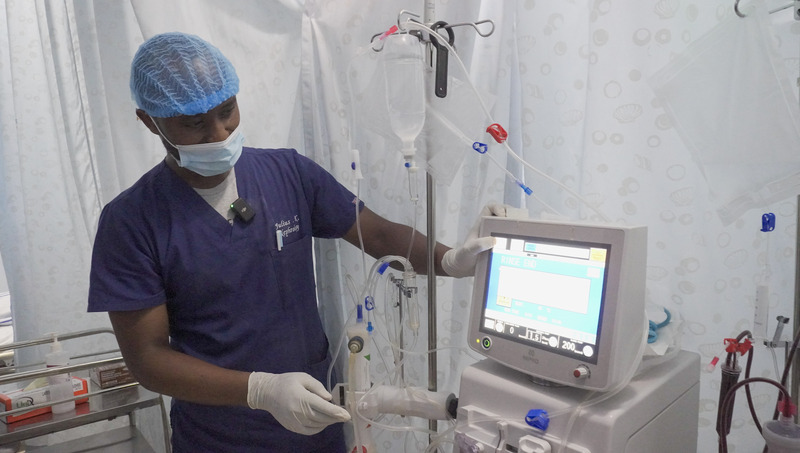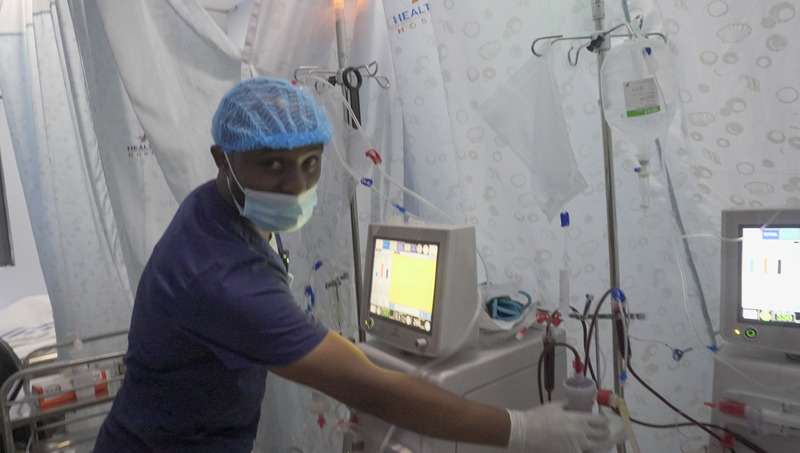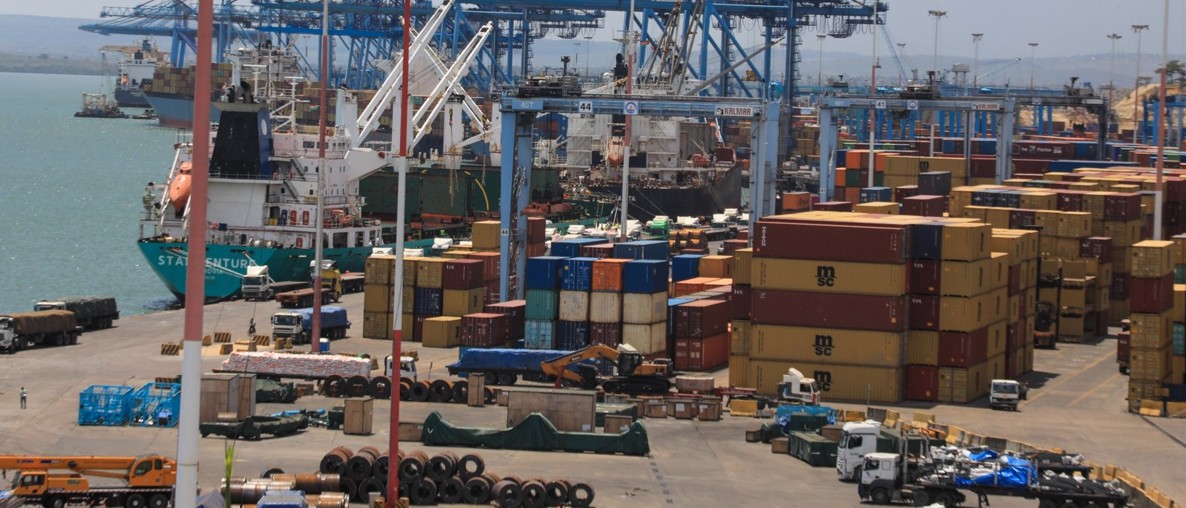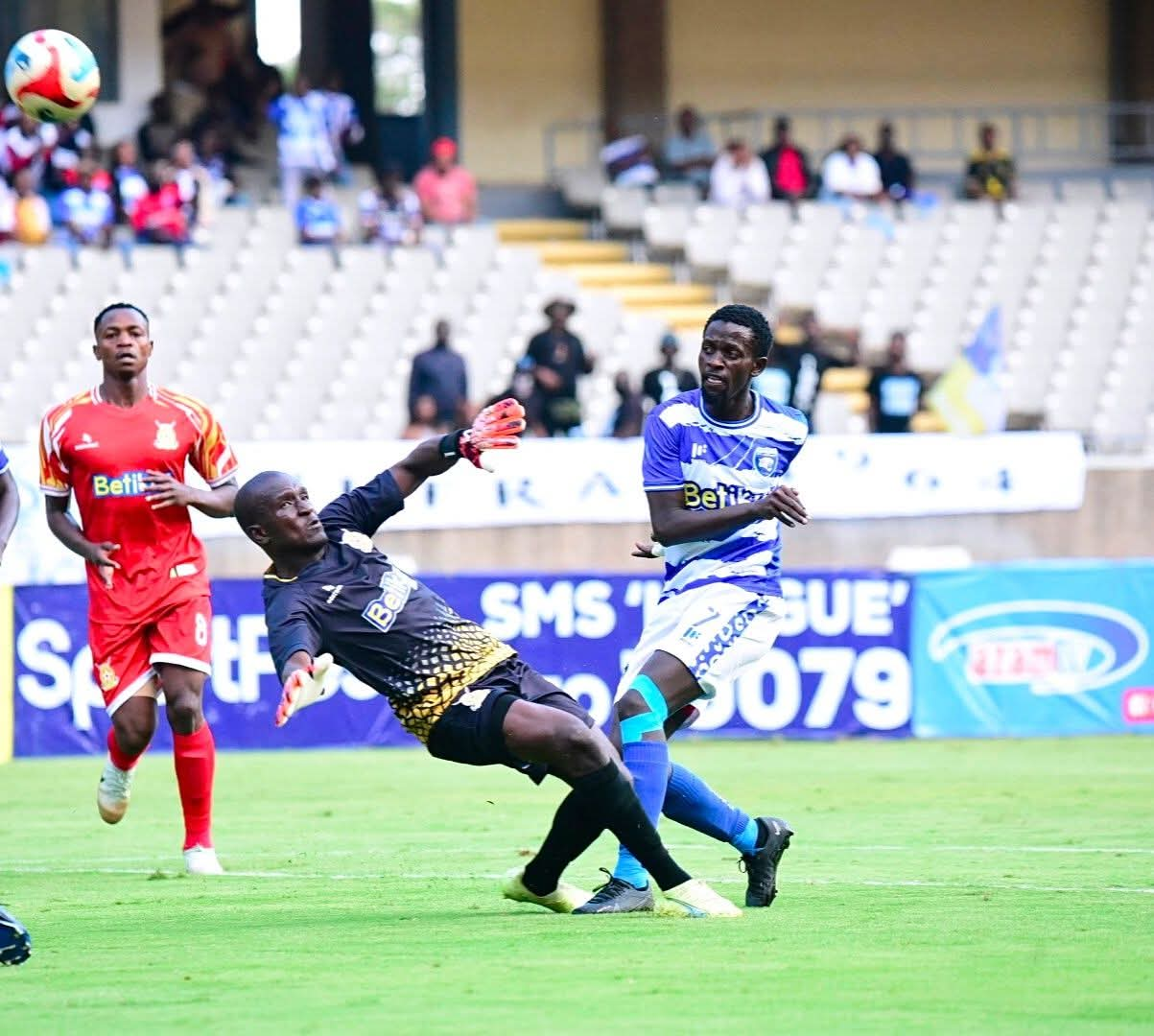World Hypertension Day: How high blood pressure is killing a lot of Kenyans as it goes undetected

Unlike many diseases that present clear symptoms, high blood pressure often goes unnoticed for years. Many people have no idea they suffer from it until significant damage has already occurred. This silent condition can quietly wreak havoc on vital organs, particularly the kidneys.
As we walk through the dialysis section of a healthcare facility in Eastleigh, it's hard not to notice the quiet desperation of four women waiting for their sessions to end so they can finally go home.
This has become their weekly routine—one dictated by a painful reality: their kidneys can no longer cleanse their bodies, and they now rely entirely on a machine to survive.
Most of them lie back in silence, their expressions blank, lost in deep thought, or perhaps simply trying to pass the time. I'm struck by how many of the patients that morning—five in total—are women of varying ages, all connected to the life-sustaining machines.
More To Read
- Health Ministry clarifies Kenya–US health partnership respects sovereignty, data protection
- Eastleigh bustles with Christmas shoppers as holiday season kicks off early
- Third Kilifi health forum opens with urgent calls for financing, digital solutions
- England confirms new mpox strain: What you need to know
- Kenya urges stronger regional cooperation as transport corridors fuel disease risks across East Africa
- Tatu City hosts Muslim business community to explore new investment opportunities
At one point, one woman shifts slightly, triggering a loud beep from her dialysis unit. Even small movements can be risky, requiring constant monitoring to prevent complications.
Unlike many diseases that present clear symptoms, high blood pressure often goes unnoticed for years. Many people have no idea they suffer from it until significant damage has already occurred. This silent condition can quietly wreak havoc on vital organs, particularly the kidneys.
Each time patients come in for dialysis, Julius Kalima, a healthcare worker, can’t help but wonder how different their situations might have been had they known about their high blood pressure earlier and taken steps to manage it.
“High blood pressure and diabetes are the leading causes of kidney failure,” he says. “But many people only realise it when it’s too late. Late diagnosis continues to plague our communities.”
His concern extends beyond individuals to the strain that preventable and lifestyle-related conditions are placing on an already overstretched healthcare system. The lack of awareness, follow-up, and preventive care is costing lives and resources.
While taking a patient’s history is essential, many individuals fail to attend regular check-ups, and some medical practitioners miss early warning signs or patterns. As a result, crucial diagnoses are often delayed. Kalima’s focus remains with his patients—people now dependent on machines, clinging to the hope of a better life that feels just out of reach.
“We need to raise more awareness to help people before it’s too late,” he says.
 Julius Kalima, a nurse at Health Gate Hospital in Eastleigh, prepares equipment ahead of patient admission on May 12, 2025. (Photo: Justine Ondieki)
Julius Kalima, a nurse at Health Gate Hospital in Eastleigh, prepares equipment ahead of patient admission on May 12, 2025. (Photo: Justine Ondieki)
High blood pressure, also known as hypertension, is a medical condition where the force of the blood against the walls of the arteries is consistently too high. Over time, this increased pressure can damage blood vessels and vital organs such as the heart, kidneys, brain, and eyes.
Dr Esther Mwaura, a physician based in Eastleigh, has observed a troubling trend: many pregnant women in the area fail to consistently attend antenatal clinics. As a result, conditions like high blood pressure often go undetected until complications arise.
“One of the saddest cases I’ve encountered involved a woman who had suffered five miscarriages. Each time, she lost the baby in the second trimester, and each time, her blood pressure was high, but she never paid attention, assuming it was a bad omen.”
Pregnancy and hypertension
After monitoring her over time, they discovered she had developed gestational diabetes, which later progressed into chronic hypertension—a condition she was unaware of.
“We advised her to monitor her condition, but she didn’t always follow through. It was only after seeing a gynaecologist and undergoing regular check-ups that she was finally able to carry a pregnancy to term. The baby was born preterm, and we recommended complete bed rest throughout the pregnancy to manage the risks,” says Dr Mwaura.
She explains that pregnancy can trigger high blood pressure, and if not properly diagnosed and managed, it can have devastating consequences. “This woman had experienced five miscarriages. It was heartbreaking—and most of it could have been prevented with proper care.”
Dr Mwaura advocates for consistent antenatal care, urging expectant mothers to remain in close contact with their healthcare providers. “High blood pressure is not something to take lightly. Symptoms like fatigue, headaches, and dizziness may seem minor, but they could be early signs. Early detection can save both mother and baby.”
She also recommends proper use of prescribed medication, staying well-hydrated, and monitoring the colour of urine, which she says can indicate underlying issues such as dehydration or kidney problems.
“Simple observations can make a big difference in catching problems early,” she adds.
She emphasises that treating high blood pressure is not only expensive, but if left unmanaged, it can lead to serious—and sometimes irreversible—health complications for both mother and child.
Awareness and treatment
According to data from the Ministry of Health, nearly one in four adults in the country are affected by hypertension, with approximately seven in ten Kenyans unaware of their condition. The prevalence of hypertension rises sharply, reaching 58.3 per cent among individuals aged 60 to 69. This alarming statistic highlights the urgent need for increased awareness and proactive public health measures.
Studies show that hypertension affects 24–28 per cent of the population, but lack of awareness and treatment rates remain a concern. Many individuals remain unaware of their condition, as hypertension often presents no symptoms, even when blood pressure readings are dangerously high.
Doctors say routine screening is vital; people should be tested for hypertension at least once a year, especially those with a family history of the condition.
About 78 per cent of people diagnosed with hypertension are not receiving treatment. Among those on treatment, only 3 per cent have achieved proper blood pressure control.
Early detection is crucial to preventing the potentially life-threatening complications of high blood pressure. Treatment typically includes lifestyle changes, such as maintaining a balanced diet, regular physical activity, limiting alcohol and tobacco use, and managing stress.
Healthcare providers may also prescribe medication. Ongoing monitoring is essential to ensure blood pressure remains within the recommended range, typically below 140/90 mmHg.
Blood pressure screening
The Ministry of Health advises all adults to undergo blood pressure screening at least once every two years. However, those at higher risk or with pre-existing health conditions should be screened more frequently. Once diagnosed with hypertension, treatment is typically lifelong, making continuous management essential to prevent severe complications.
Women are disproportionately affected by high blood pressure due to a mix of biological, hormonal, and socioeconomic factors.
Hormonal changes during pregnancy and menopause can raise the risk. Pregnancy-related conditions such as gestational hypertension and preeclampsia can result in long-term high blood pressure, while the loss of oestrogen during menopause contributes to vascular changes that elevate risk.
Socially, women often face greater stress levels due to caregiving responsibilities and balancing work and family pressures. These factors, combined with poor diet, physical inactivity, and limited access to healthcare, exacerbate the risk of developing hypertension. Additionally, women tend to have smaller blood vessels, which can make blood pressure harder to control.
Moreover, high blood pressure in women is frequently underdiagnosed. Many do not receive adequate screenings or fail to recognise early signs, leading to delayed diagnoses and more severe complications.
Early detection and proper management are critical to preventing long-term damage such as kidney failure, heart disease, and stroke.
As the world marks World Hypertension Day, with the theme "Measure Your Blood Pressure Accurately, Control It, Live Longer", it is a timely reminder of the importance of early detection, accurate measurement, and consistent management of high blood pressure.
Top Stories Today
















































